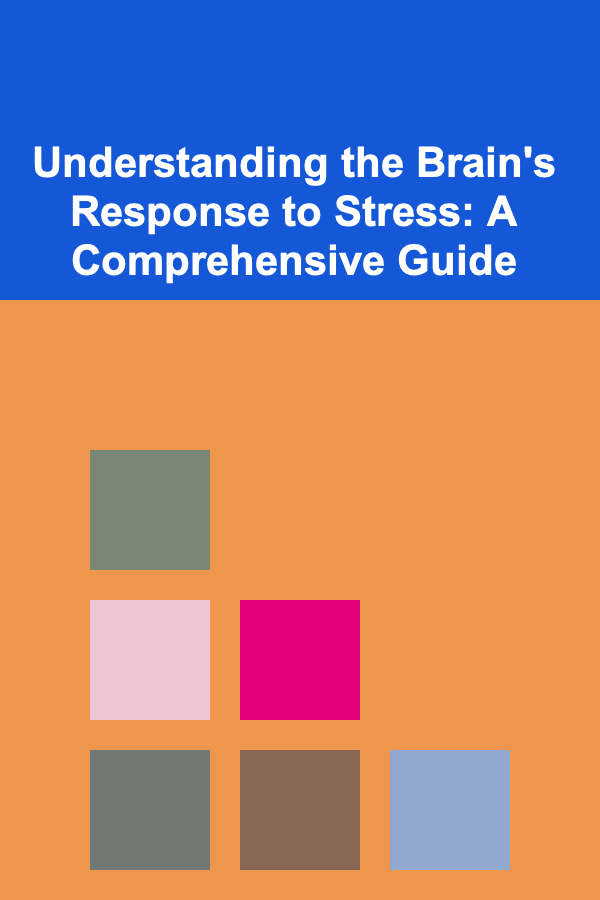
Understanding the Brain's Response to Stress: A Comprehensive Guide
ebook include PDF & Audio bundle (Micro Guide)
$12.99$5.99
Limited Time Offer! Order within the next:

Stress, an inherent part of the human experience, is more than just a feeling. It's a complex physiological and psychological response to any demand, pressure, or perceived threat. While acute stress can be adaptive, helping us react quickly in emergencies, chronic stress can wreak havoc on our physical and mental well-being. Understanding how the brain orchestrates the stress response is crucial for developing effective strategies to manage and mitigate its detrimental effects. This comprehensive guide delves into the intricate neural pathways, hormonal cascades, and cognitive processes involved in the brain's response to stress, offering insights into how to navigate the challenges of modern life with resilience and well-being.
The Neurobiological Foundation of Stress: Key Players
The brain's response to stress is a symphony of interconnected neural structures and hormonal systems. Several key brain regions play pivotal roles in detecting, processing, and responding to stressful stimuli.
1. The Hypothalamus: The Stress Response Orchestrator
The hypothalamus, a small but mighty brain region located deep within the brain, acts as the command center for the stress response. Upon perceiving a threat, the hypothalamus initiates a cascade of events, beginning with the activation of the Hypothalamic-Pituitary-Adrenal (HPA) axis. This axis is a critical hormonal pathway that regulates the body's response to stress.
The hypothalamus releases corticotropin-releasing hormone (CRH), which travels to the pituitary gland. CRH is a neuropeptide that acts as a key messenger molecule, initiating a series of events within the HPA axis. It essentially kickstarts the entire stress response process.
2. The Pituitary Gland: Releasing the Adrenal Call to Action
The pituitary gland, a pea-sized gland located at the base of the brain, receives the CRH signal from the hypothalamus. In response, the pituitary gland releases adrenocorticotropic hormone (ACTH) into the bloodstream. ACTH is another crucial hormone in the stress response pathway, acting as a direct messenger to the adrenal glands.
3. The Adrenal Glands: Hormonal Responders
The adrenal glands, located atop the kidneys, are the primary responders to ACTH. When ACTH reaches the adrenal glands, it stimulates them to produce and release cortisol, the primary stress hormone. Cortisol plays a vital role in preparing the body to deal with the perceived threat. It increases blood sugar levels to provide energy, suppresses the immune system to conserve resources, and redirects energy away from non-essential functions like digestion. The adrenal medulla, another part of the adrenal glands, also releases epinephrine (adrenaline) and norepinephrine (noradrenaline), which contribute to the "fight-or-flight" response.
4. The Amygdala: The Emotional Sentinel
The amygdala, a brain region associated with emotions, particularly fear and anxiety, plays a crucial role in detecting and evaluating potential threats. It acts as an emotional sentinel, rapidly assessing sensory information for signs of danger. When the amygdala perceives a threat, it activates the hypothalamus, triggering the HPA axis and the release of stress hormones. The amygdala's hyper-reactivity can contribute to anxiety disorders and heightened stress responses. It's important to note that the amygdala doesn't operate in isolation; it heavily relies on input from other brain regions, especially the sensory cortices and the hippocampus.
5. The Hippocampus: Context and Memory
The hippocampus, a brain region critical for memory formation and spatial navigation, also plays a crucial role in regulating the stress response. The hippocampus provides contextual information about the environment and past experiences, helping to dampen the stress response when a perceived threat is not actually dangerous. The hippocampus contains receptors for cortisol, allowing it to monitor cortisol levels in the bloodstream and provide feedback to the hypothalamus, helping to shut down the HPA axis once the threat has passed. Chronic stress can impair hippocampal function, leading to memory problems and a dysregulated stress response.
6. The Prefrontal Cortex: Executive Control
The prefrontal cortex (PFC), the brain region responsible for executive functions such as planning, decision-making, and impulse control, plays a crucial role in regulating the stress response. The PFC can help to suppress the amygdala's activity and promote more rational and adaptive responses to stress. However, chronic stress can impair PFC function, making it more difficult to regulate emotions and make sound decisions. Mindfulness and cognitive behavioral therapy (CBT) are often used to strengthen prefrontal cortex function and improve stress resilience.
The Hormonal Cascade: Cortisol, Epinephrine, and Norepinephrine
The release of stress hormones is a key component of the brain's response to stress. Cortisol, epinephrine (adrenaline), and norepinephrine (noradrenaline) are the primary hormones involved, each playing a distinct role in preparing the body to deal with the perceived threat.
1. Cortisol: The Primary Stress Hormone
Cortisol, the primary stress hormone, is released from the adrenal cortex in response to ACTH. It has a wide range of effects on the body, including:
- Increasing blood sugar levels: Cortisol stimulates the liver to produce glucose, providing the body with energy to fuel the "fight-or-flight" response.
- Suppressing the immune system: Cortisol inhibits the production of inflammatory cytokines, reducing inflammation and conserving energy. While short-term immune suppression can be beneficial in an acute stress situation, chronic exposure to cortisol can weaken the immune system and increase susceptibility to illness.
- Redirecting energy away from non-essential functions: Cortisol reduces digestive activity and reproductive functions, prioritizing energy for immediate survival.
- Enhancing memory consolidation: In the short term, cortisol can enhance memory consolidation, helping us remember important details about the stressful event. However, chronic exposure to cortisol can impair memory formation and retrieval.
2. Epinephrine (Adrenaline): The "Fight-or-Flight" Hormone
Epinephrine, also known as adrenaline, is released from the adrenal medulla in response to stress. It plays a crucial role in the "fight-or-flight" response, triggering a rapid surge of energy and preparing the body for immediate action. Epinephrine's effects include:
- Increasing heart rate and blood pressure: Epinephrine increases heart rate and blood pressure, delivering more oxygen and nutrients to the muscles.
- Dilating the airways: Epinephrine dilates the airways, making it easier to breathe.
- Increasing alertness and focus: Epinephrine enhances alertness and focus, allowing us to react quickly to the perceived threat.
- Releasing glucose from storage: Epinephrine stimulates the release of glucose from glycogen stores in the liver and muscles, providing the body with a readily available source of energy.
3. Norepinephrine (Noradrenaline): Vigilance and Focus
Norepinephrine, also known as noradrenaline, is released from the adrenal medulla and neurons in the brain. It works in conjunction with epinephrine to enhance alertness, focus, and vigilance. Norepinephrine's effects include:
- Increasing alertness and arousal: Norepinephrine increases alertness and arousal, making us more aware of our surroundings.
- Improving focus and attention: Norepinephrine improves focus and attention, allowing us to concentrate on the perceived threat.
- Suppressing pain: Norepinephrine can suppress pain signals, allowing us to focus on survival.
- Regulating blood pressure: Norepinephrine helps regulate blood pressure and maintain cardiovascular function during stress.
The Impact of Chronic Stress on the Brain
While the acute stress response is adaptive and can be beneficial in the short term, chronic stress can have devastating effects on the brain and body. Prolonged exposure to stress hormones can alter brain structure and function, leading to a variety of mental and physical health problems.
1. Brain Structure Changes
Chronic stress can lead to structural changes in several key brain regions:
- Hippocampal Atrophy: Chronic stress can shrink the hippocampus, the brain region responsible for memory and learning. This can lead to memory problems, difficulty learning new information, and increased vulnerability to mental health disorders. The elevated cortisol levels associated with chronic stress are believed to be a major contributor to hippocampal atrophy.
- Amygdala Hypertrophy: Chronic stress can enlarge the amygdala, the brain region associated with fear and anxiety. This can lead to increased anxiety, heightened reactivity to stress, and an increased risk of developing anxiety disorders. The amygdala becomes more sensitive and reactive to potential threats, even in non-threatening situations.
- Prefrontal Cortex Thinning: Chronic stress can thin the prefrontal cortex, the brain region responsible for executive functions such as planning, decision-making, and impulse control. This can lead to impaired cognitive function, difficulty regulating emotions, and increased impulsivity.
2. Neurotransmitter Imbalances
Chronic stress can disrupt the balance of neurotransmitters in the brain, leading to mood disorders and cognitive impairments:
- Serotonin: Chronic stress can deplete serotonin levels, a neurotransmitter that regulates mood, sleep, and appetite. Low serotonin levels are associated with depression, anxiety, and sleep problems.
- Dopamine: Chronic stress can disrupt dopamine signaling, a neurotransmitter that plays a role in motivation, reward, and pleasure. Dysregulation of dopamine can lead to anhedonia (loss of pleasure), fatigue, and difficulty concentrating.
- Glutamate: Chronic stress can increase glutamate levels, an excitatory neurotransmitter that can damage neurons when present in excessive amounts. Glutamate excitotoxicity can contribute to neurodegeneration and cognitive impairment.
3. Increased Inflammation
Chronic stress can trigger chronic inflammation throughout the body, including the brain. Inflammation can damage brain cells and contribute to neurodegenerative diseases such as Alzheimer's disease and Parkinson's disease. Stress hormones can activate immune cells in the brain, leading to the release of inflammatory cytokines. This chronic inflammatory state can disrupt normal brain function and contribute to a range of mental and physical health problems.
4. Impaired Neuroplasticity
Chronic stress can impair neuroplasticity, the brain's ability to reorganize itself by forming new neural connections throughout life. This can make it more difficult to learn new things, adapt to changing circumstances, and recover from brain injuries. Neuroplasticity is crucial for resilience and adaptation in the face of stress, and chronic stress can significantly reduce the brain's capacity for change.
Cognitive and Emotional Responses to Stress
The brain's response to stress extends beyond the purely biological and hormonal. It also involves cognitive and emotional processes that shape how we perceive, interpret, and react to stressful situations.
1. Cognitive Appraisal: Perceiving the Threat
Cognitive appraisal refers to the process of evaluating a situation to determine whether it is threatening or challenging. This appraisal influences the intensity and duration of the stress response. Lazarus and Folkman's Transactional Model of Stress and Coping emphasizes the importance of cognitive appraisal in determining the stress response. This model proposes that stress is not simply a function of the external event, but rather the individual's interpretation of the event and their perceived ability to cope with it.
There are two main types of cognitive appraisal:
- Primary Appraisal: Evaluating the potential threat. Is this situation harmful, threatening, or challenging?
- Secondary Appraisal: Evaluating our resources and coping abilities. Do I have the resources and skills to deal with this situation?
If we perceive a situation as threatening and believe we lack the resources to cope, we are more likely to experience a strong stress response.
2. Emotional Regulation: Managing Feelings
Emotional regulation refers to the ability to manage and control our emotions, particularly negative emotions such as fear, anxiety, and anger. Effective emotional regulation is crucial for coping with stress. Individuals with poor emotional regulation skills are more likely to experience heightened stress responses and difficulty recovering from stressful events.
Several strategies can be used to regulate emotions, including:
- Cognitive Reappraisal: Changing the way we think about a stressful situation to make it less threatening. For example, instead of viewing a job interview as a terrifying ordeal, we can reframe it as an opportunity to showcase our skills and learn more about the company.
- Problem-Focused Coping: Taking direct action to solve the problem causing the stress. For example, if we are stressed about a deadline, we can break the task down into smaller steps and create a realistic schedule.
- Emotion-Focused Coping: Managing the emotions associated with the stress. This can involve techniques such as deep breathing, meditation, or seeking social support.
3. Rumination and Worry: Perpetuating Stress
Rumination and worry are cognitive processes that can perpetuate stress. Rumination involves dwelling on negative thoughts and feelings about the past, while worry involves focusing on potential future threats. Both rumination and worry can prolong the stress response and interfere with effective coping.
Strategies for reducing rumination and worry include:
- Mindfulness Meditation: Focusing on the present moment without judgment can help interrupt the cycle of rumination and worry.
- Cognitive Restructuring: Identifying and challenging negative thoughts and beliefs.
- Engaging in Pleasant Activities: Distracting ourselves from negative thoughts by engaging in enjoyable activities.
Strategies for Managing Stress and Enhancing Brain Health
Understanding the brain's response to stress provides valuable insights into how to manage stress and enhance brain health. Several strategies can be used to mitigate the negative effects of stress and promote resilience.
1. Mindfulness and Meditation
Mindfulness and meditation practices can help to regulate the stress response by reducing amygdala activity and strengthening prefrontal cortex function. Mindfulness involves paying attention to the present moment without judgment, while meditation involves training the mind to focus and quiet the internal chatter. Regular mindfulness and meditation practice can lead to reduced anxiety, improved mood, and enhanced cognitive function. Studies have shown that meditation can actually increase gray matter in brain regions associated with attention and emotional regulation.
2. Exercise
Regular physical exercise is a powerful stress reliever. Exercise helps to reduce stress hormones, increase endorphins (natural mood boosters), and improve sleep. Exercise also promotes neuroplasticity and protects against age-related cognitive decline. Even moderate exercise, such as brisk walking, can have significant benefits for brain health and stress management.
3. Social Support
Strong social connections are essential for resilience. Social support provides a buffer against stress and promotes positive emotions. Spending time with loved ones, engaging in social activities, and seeking support from friends and family can help to reduce stress and improve well-being. Research shows that social isolation can have a detrimental impact on both physical and mental health, increasing the risk of chronic diseases and mental health disorders.
4. Cognitive Behavioral Therapy (CBT)
CBT is a type of therapy that helps individuals identify and change negative thought patterns and behaviors that contribute to stress. CBT can be used to address a variety of stress-related problems, including anxiety, depression, and insomnia. CBT techniques, such as cognitive restructuring and behavioral activation, can help individuals develop more adaptive coping strategies and improve their emotional regulation skills.
5. Sleep Hygiene
Adequate sleep is crucial for brain health and stress management. Sleep deprivation can impair cognitive function, increase stress hormones, and weaken the immune system. Establishing a regular sleep schedule, creating a relaxing bedtime routine, and ensuring a comfortable sleep environment can improve sleep quality and reduce stress. Aim for 7-9 hours of sleep per night for optimal brain function and overall well-being.
6. Nutrition
A healthy diet is essential for brain health and stress resilience. Eating a balanced diet rich in fruits, vegetables, whole grains, and lean protein can provide the brain with the nutrients it needs to function optimally. Avoiding processed foods, sugary drinks, and excessive caffeine and alcohol can also help to reduce stress and improve overall health. Specific nutrients, such as omega-3 fatty acids, B vitamins, and magnesium, are particularly important for brain health and stress management.
7. Time Management and Prioritization
Effective time management and prioritization skills can reduce stress by helping individuals feel more in control of their lives. Breaking down large tasks into smaller steps, setting realistic goals, and prioritizing tasks based on importance and urgency can help to reduce feelings of overwhelm and increase productivity. Techniques such as the Eisenhower Matrix (urgent/important) can be helpful for prioritizing tasks effectively.
Conclusion: Cultivating Resilience in the Face of Stress
The brain's response to stress is a complex and multifaceted process involving intricate neural pathways, hormonal cascades, and cognitive processes. Understanding these mechanisms is crucial for developing effective strategies to manage stress and promote brain health. By implementing the strategies outlined in this guide, individuals can cultivate resilience in the face of stress, enhance their cognitive function, and improve their overall well-being. Remember that building resilience is an ongoing process that requires commitment and practice. Be patient with yourself, celebrate your successes, and seek support when needed. By prioritizing your mental and physical health, you can navigate the challenges of modern life with greater ease and resilience, fostering a more fulfilling and meaningful life.

How to Create a Checklist for Identifying the Right Social Media Platforms
Read More
Why Organizing Your Bathroom Products Can Reduce Stress
Read More
How to Choose the Best Flooring for Your Lifestyle
Read More
How to Write a Comprehensive Test Plan
Read More
10 Tips for Winning More Billiards Games: Strategy and Tactics
Read More
10 Tips for Advanced Volleyball Footwork Drills
Read MoreOther Products

How to Create a Checklist for Identifying the Right Social Media Platforms
Read More
Why Organizing Your Bathroom Products Can Reduce Stress
Read More
How to Choose the Best Flooring for Your Lifestyle
Read More
How to Write a Comprehensive Test Plan
Read More
10 Tips for Winning More Billiards Games: Strategy and Tactics
Read More